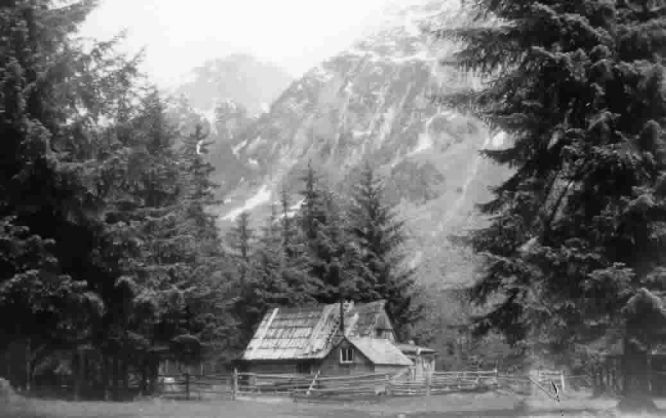Pioneers

John Stark
Photo - DJ Rainey's Cabin - First Cabin in Stewart
TWO COLORFULL PIONEERS
Back in 1898, when that unsung bunco artist lured 60-odd men from Seattle to the Portland Canal district, one of the pioneers thus attracted was a colored man named Cook.
It was he who found the float that started Dad Rainey on his trip to Michigan to raise funds and form a company to further prospect the country. Rainey later returned to stake the first claims on Bitter Creek, about 1900.
Two years later, Bill Noble and Rainey were "over by the Bear River, and noticed what was thought was a bear on the other side, standing up on its hind legs." After a closer look, they realized that it was a man, waving his arms.
Rowing over to investigate, they found a colored prospector, John Stark. This trio became the greatest of friends.
It seems that Stark first worked for M. K. Rogers at the Bonanza group, Goose Bay (Anyox) in 1901, before trying his luck on the Portland Canal.
In 1902 a group of claims were staked at Maple Bay by William Noble, where some good copper float had been found which assayed $70 in gold and 17 per cent copper. This was shown to Rogers, who represented American interests.
Stewart in foreground, Portland Canal Upon a recommendation by Noble, Stark was sent to prospect the ground. He staked about 100 claims, Noble paying him a tribute by saying: "He could get over more ground than any man I ever knew."
In those days, there were no trails or bridges, and to facilitate development, the line of least resistance was taken--fording the streams at their narrowest points and generally keeping to the valley floor.
The first cable bridge across the Bear River was constructed by Noble and Stark, on the site of the present bridge, in 1904.
Stark remained in the Stewart district for a number of years, then moved to Alice Arm during the Kitsault River boom, when the Dolly Varden became the big silver producer. It was there that I met John, while prospecting on McGraw Mountain.
By 1926 he was caretaker at the Dolly Varden and, that summer, he and I were the only guests at the 30-room Alice Arm Hotel. We had some wonderful nights with Ole Evindsen, one of the original stakers of the Dolly Varden, reminiscing.
Ole was known as a big man in the camp, but, old John laughed, he was "the first white man to come to this district." John told of prospecting near Stewart with Dad Rainey, one of the first settlers in the Portland Canal district, and a man who did not know the meaning of fear.
Rafting across Bear River They were crossing the Bear River, in a small boat loaded with supplies, when the current caught the craft and swamped it on a submerged tree root. They clung to this for hours until Bill Miller (first government liquor vendor at Prince Rupert) came across them. He hurried back to camp for his axe and proceeded to fall trees towards them until, finally, they were able to reach shore by way of Miller's improvised bridge.
It was one of John's closest calls, and Rainey often spoke of the experience in that glacial cold water as his damdest.
Election night, September 14, 1926, at the Alice Arm Hotel, when everyone had a drink together, was the last time John was seem in these parts. With his death, September 28, 1930, there passed one of the best-known characters in the mining circles of the north.
He had been in the Telegraph Creek district, looking over some ground he had staked years before, when he was caught in a snowstorm and contracted a severe cold.
He set out for Telegraph Creek, hoping to make it in a day, but it took him four, by which time his condition was such that the government road superintendent, Jack Anderson, took him to Anyox hospital.
Shortly after, John Stark--"the only white man in the district"--passed away.
NEXT BILL TOOTH